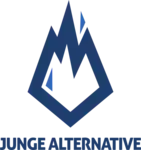Young Alternative for Germany
The Young Alternative for Germany (German: Junge Alternative für Deutschland or JA) is a political youth organisation in Germany. Founded on 15 June 2013 in Darmstadt and open to people aged 14 to 35 years, it presents itself as the youth wing of the Alternative for Germany (AfD) party, but remains legally independent.[3] Its chairman is Hannes Gnauck,[1][4] and its vice-chairpersons are[4] Sven Kachelmann, Tomasz Froelich and Nils Hartwig.

| Young Alternative for Germany Junge Alternative für Deutschland | |
|---|---|
 Logo since 2019 | |
| Chairperson | Hannes Gnauck[1] |
| Founded | 15 June 2013 |
| Headquarters | Berlin |
| Membership | 800 (2016)[2]: 202 |
| Ideology | German nationalism Right-wing populism Euroscepticism National conservatism Anti-immigration Anti-feminism Anti-Islam Anti-communism |
| Position | Far-right |
| Mother party | Alternative for Germany |
| Website | www.jungealternative.de |
Since 2023, the JA has been classified as a right-wing extremist organisation by the German national intelligence service Federal Office for the Protection of the Constitution (BfV) after being a case of suspicion and an object of observation since 2019.[5]
History
The JA was founded in June 2013, four months after the AfD, with Torsten Heinrich as the organisation's first chairperson.[2]: 202 Heinrich left the party in March 2014.[2]: 202
In view of the JA's independence, it has been regarded by the AfD hierarchy as being somewhat wayward,[6] with the JA repeatedly accused of being "too far right,"[7] politically regressive and anti-feminist among the German media.[6]
In March 2014, the Junge Alternative hosted Nigel Farage who had been invited to address the party's North Rhine-Westphalia organisation in Cologne.[8] The invitation is alleged to have caused some trouble within the AfD itself over the youth wing’s unauthorised invitation of Farage, with the regional association and the youth wing wanting to stress their independence.[9] The invitation was contrary to a decision of the AfD National Executive whose policy is that official contact with foreign parties is decided only by the federal executive.[7] Nigel Farage's presence apparently led to a deterioration in relations with Bernd Lucke, the then-AfD leader, who called the move a "sign of poor political tact."[6]
The JA launched an anti-feminist campaign entitled "Gleichberechtigung statt Gleichmacherei" (variously translated as "equal rights, not levelling down"[10] or "equality instead of uniformity"[6]) on Facebook in response to the Young Socialists in the SPD, which posted photos supportive of feminism to mark International Women's Day. The Facebook page of JA describes feminism as a "left-wing ideology", and asks people to post reasons to reject it.[10] The campaign was in reaction to proposals for gender quotas.[11][12] Sections of the German media labelled election campaign material of the JA which showed attractive women in swimwear under the slogan "equality instead of uniformity" as in bad taste.[6] The JA followed with a poster of four shirtless men under the slogan "end soft justice".[6]
In May 2014, the JA is said to have further irritated AfD bosses with a statement they released on Facebook advocating vigilante action against crime.[13]
By 2016, the JA reported that it had over 800 members across 16 regional organisations.[2]: 202 At the time, the JA was the official youth party of AfD state parties in North Rhine-Westphalia, Saarland, Hamburg, Baden-Württemberg, Bavaria, Rhineland-Palatinate, and Berlin.[2]: 202 Although it is the de facto youth party of AfD, it is not affiliated at the federal level.[2]: 202
A 2021 report from the US State Department said that the Bavarian Office for the Protection of the Constitution was monitoring the JA.[14]
References
- "Junge Alternative wählt als Extremisten eingestuften Soldaten zum Bundesvorsitzenden" [Junge Alternative elects soldier classified as extremist as federal chairman]. Der Spiegel (in German). 16 October 2022. Retrieved 20 January 2023.
- Anna-Lena Herkenhoff (2016). "Rechter Nachwuchs für die AfD – die Junge Alternative (JA)". In Häusler, Alexander (ed.). Die Alternative für Deutschland: Programmatik, Entwicklung und politische Verortung (in German). Springer VS Wiesbaden. pp. 201–217. ISBN 978-3-658-10637-9.
- "Bernd Lucke und die wilde Jugend" (in German). N24. 13 June 2014. Retrieved 2 July 2014.
- "Bundesvorstand". Bundesvorstand Alternative für Deutschland (in German). AfD. Retrieved 20 January 2023.
- "Bundesamt für Verfassungsschutz stuft „Institut für Staatspolitik", „Ein Prozent e.V." und „Junge Alternative" als gesichert rechtsextremistische Bestrebungen ein". Bundesamt für Verfassungsschutz (in German). Retrieved 24 May 2023.
- Lamparski, NIna (12 May 2014). "Germany's youth rebels against EU". BBC News. Retrieved 12 May 2014.
- Krass, Sebastian (31 March 2014). "Zu weit rechts". Süddeutsche Zeitung (in German). Retrieved 12 May 2014.
- "Junge Alternative: Nigel Farage zu Gast in Köln". Eigenmütlich Frei Magazine (in German). 19 March 2014. Retrieved 20 March 2014.
- Weingärtner, Daniela (April 2014). "March of the populists". The German Times. Retrieved 16 April 2014.
- White, J. Arthur (31 March 2014). "Anti-euro party turns anti-feminist". The Local (de). Retrieved 11 May 2014.
- "Anti-feminist campaign targets German gender quota proposal". Al Jazeera. 1 April 2014. Archived from the original on 4 April 2014. Retrieved 12 May 2014.
- Patrick Timmann (21 March 2014). "Germany's Eurosceptic AfD meets to define party platform". Euractiv. Retrieved 9 October 2023.
- Wagstyl, Stefan (22 May 2014). "Germany's anti-euro party AfD breaks national taboos". Financial Times. Retrieved 24 May 2014.
- "2021 Country Reports on Human Rights Practices: Germany". US State Department. 2021. Retrieved 9 October 2023.
External links
- Official website
 (in German)
(in German)